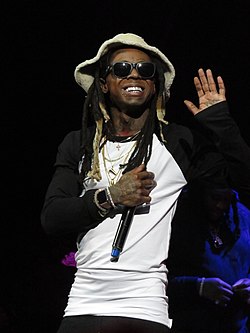Last Updated on April 6, 2025 by Bertrand Clarke
Dwayne Michael Carter Jr., better known to the world as Lil Wayne, is more than just a rapper; he’s a cultural icon, a lyrical innovator, and a survivor whose life story reads like a modern-day epic. From the streets of New Orleans’ Hollygrove neighborhood to the pinnacle of the music industry, Wayne’s journey is a testament to resilience, raw talent, and an unwavering commitment to his craft. This is the story of Lil Wayne, a life etched in ink, rhythm, and relentless self-expression.
A Childhood Forged in Fire:
Born on September 27, 1982, in New Orleans, Louisiana, young Dwayne faced adversity from the outset. His father abandoned the family when he was just two years old, leaving his mother, Jacida Carter, to raise him single-handedly. Hollygrove, a neighborhood riddled with poverty and violence, became the backdrop for his formative years. It was a world where survival demanded toughness, and where dreams often struggled to take flight.
Despite the hardships, Wayne found solace in music. He credits his mother and grandmother for instilling in him a love for gospel and blues, which subtly influenced his later musical style. He was a bright and inquisitive child, but the allure of the streets was strong. The lure of easy money and perceived respect was a constant temptation.
The Spark Ignites: Finding His Voice:
Wayne’s introduction to hip-hop came through the local scene. He was mesmerized by the lyrical dexterity and storytelling prowess of artists like N.W.A. and the Geto Boys. He began writing his own rhymes at the tender age of eight, filling notebooks with his observations of the world around him.
His passion for rap caught the attention of Bryan “Birdman” Williams, co-founder of Cash Money Records. At the age of nine, Wayne impressed Birdman with his raw talent and street smarts, leading to his signing with the label. He became the youngest member of Cash Money Records, instantly immersing himself in the burgeoning hip-hop scene.
Early Hardships and a Defining Moment:
Despite his promising start, Wayne’s early life was marked by a deeply traumatic event. At the age of 12, he accidentally shot himself in the chest with a 9mm handgun. While the circumstances surrounding the incident remain somewhat unclear, Wayne has openly discussed the profound impact it had on his life. Some say it was accidental while others have said it was a suicide attempt. This brush with death served as a stark wake-up call, solidifying his determination to succeed and escape the cycle of violence that plagued his community.
The Hot Boys Era: Forging a Path:
In the mid-1990s, Wayne joined the Hot Boys, a group comprised of fellow Cash Money artists Juvenile, B.G., and Turk. The group’s raw energy and unapologetic lyrics resonated with audiences, catapulting them to regional fame. Their albums, Get It How U Live! (1997) and Guerrilla Warfare (1999), achieved platinum status, solidifying Cash Money’s position as a dominant force in hip-hop.
While the Hot Boys provided Wayne with invaluable experience and exposure, he yearned for individual recognition. He felt constrained by the group dynamic and was eager to explore his own artistic vision.
Solo Flight: Tha Block Is Hot and the Ascent Begins:
In 1999, at the age of 16, Lil Wayne released his debut solo album, Tha Block Is Hot. The album, fueled by the hit single of the same name, was a commercial success, reaching platinum status and establishing Wayne as a solo artist to be reckoned with. Critics lauded his unique flow, clever wordplay, and unflinching portrayal of life in Hollygrove.
However, Wayne wasn’t content to rest on his laurels. He recognized the need to constantly evolve his sound and push the boundaries of his creativity. The early 2000s saw him experimenting with different styles, refining his lyrics, and honing his performance skills.
The Mixtape King: Cementing His Legacy:
While his official albums achieved varying degrees of success, it was Wayne’s mixtape run in the mid-2000s that truly cemented his status as a hip-hop icon. Mixtapes like Da Drought, Dedication, and No Ceilings showcased his lyrical prowess, versatility, and relentless work ethic. He flooded the streets with new music, often remixing popular songs and adding his own unique flavor.
These mixtapes were not just collections of throwaway tracks; they were carefully curated projects that demonstrated Wayne’s growth as an artist. They earned him a massive following, particularly among younger listeners who were drawn to his rebellious spirit and unconventional style.
** Tha Carter Series: Reaching the Pinnacle:**
The Tha Carter album series became synonymous with Lil Wayne’s name. Each installment marked a significant step forward in his artistic development. Tha Carter (2004) showcased his lyrical maturity, while Tha Carter II (2005) solidified his position as one of the top rappers in the game. However, it was Tha Carter III (2008) that catapulted him to superstardom.
Tha Carter III was a commercial and critical triumph, selling over a million copies in its first week and earning Wayne a Grammy Award for Best Rap Album. The album spawned several hit singles, including “Lollipop” and “A Milli,” which became anthems for a generation.
Challenges and Controversies:
Wayne’s journey has not been without its share of challenges and controversies. He has faced legal troubles, including drug charges and a gun possession conviction that resulted in a prison sentence. His highly publicized feuds with other artists have also generated considerable media attention.
His personal life has also been subject to intense scrutiny. His relationships, his struggles with addiction, and his health problems have all been fodder for tabloids and gossip blogs.
Redemption and Resilience:
Despite the setbacks, Wayne has consistently demonstrated his resilience and ability to bounce back from adversity. He has used his music as a platform to address his struggles, share his vulnerabilities, and inspire others to overcome their own challenges.
He has also become a vocal advocate for social justice, speaking out against police brutality and systemic inequality. He has used his platform to raise awareness about issues that are important to him and to encourage his fans to get involved in their communities.
An Enduring Legacy:
Lil Wayne’s impact on hip-hop is undeniable. He has influenced countless artists with his innovative flow, his unconventional rhymes, and his fearless approach to music. He has pushed the boundaries of the genre and helped to shape the sound of contemporary hip-hop.
Beyond his musical achievements, Wayne has also become a cultural icon. His distinctive style, his tattoos, and his unapologetic individuality have resonated with fans around the world. He is a symbol of self-expression and a role model for those who dare to be different.
Lil Wayne’s story is a testament to the power of resilience, the importance of self-belief, and the transformative potential of music. From the streets of Hollygrove to the heights of hip-hop royalty, he has defied expectations, overcome obstacles, and left an indelible mark on the world. His journey is far from over, and his legacy continues to evolve with each new verse, each new album, and each new chapter in his extraordinary life. He remains, and will continue to remain, an inspiration to those searching for a role model to inspire them.










